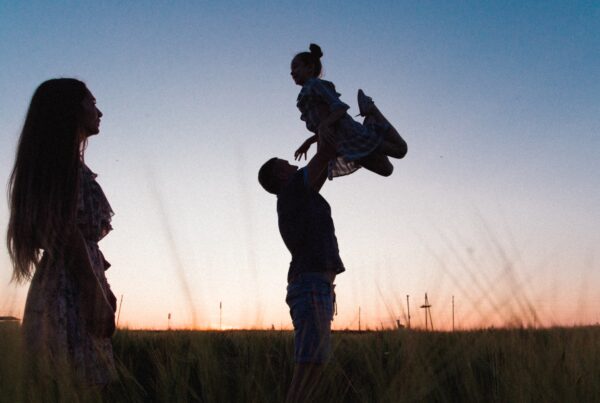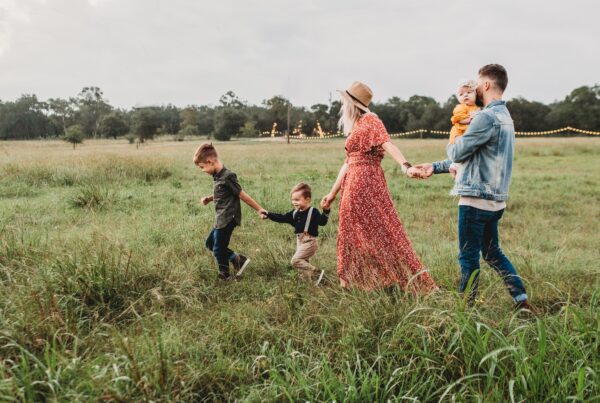If you asked most Christian parents, they would say that the most important thing that they can teach and share with their children is the gospel. If you’re like me, you know that the good news that Jesus has come to save sinners and bring us back into a relationship with Himself is the message that our children need more than any other in their life. But also if you’re like me, you may sometimes wonder “am I saying the right thing? What is the best way to do this? where do I even begin? How do I know my child understands what I’m saying?”. These questions are good to think about as we lovingly and intentionally share the best news ever with our children. There are four questions that I believe are important when thinking about sharing the gospel with children: What is the content? How can we use testimonies? What do these conversations look like? And when and how should these conversations take place?
For this article let’s look at the first question: What is the content? What is the message we share with our children?
In order to share the gospel, we have to know the gospel. If you’ve grown up in church and have read even small sections of the Bible, you know that the Gospel contains so much about who God is, what He has done, and what He is still doing that it can be a little overwhelming. Hopefully, as a parent, you are still growing in your understanding of the gospel. So when it comes to children, where do we start?
Personally, I like to start with a framework of the Gospel story as it is found in scripture. There are four stages to the gospel story: Creation, Fall, Redemption, and Restoration. Each is followed by teaching focuses which are truths we learn from each stage.
Creation
The Gospel begins at the creation of all things. God created everything. All of creation was made by god, with the prize creation, humans being the focus of all that was made. Because we were created in God’s image, we were separate and special in God’s creation. We were made with a purpose, to worship God, obey Him and His commands, and to live with Him forever. I usually talk about Adam and Eve but also make it clear that God also created every one of us with this same purpose. (Genesis 1-2, Romans 1:20, Romans 11:36, Colossians 1:16, Acts 17:24-28)
Teaching focus for kids:
- God created everything. (Genesis 1-2)
- God specifically created YOU! (Psalm 139:13-14)
- God made us special because we are in His image. (Genesis 1:27)
- God gives every person meaning and purpose. (Colossians 1:16)
- God made us to have a relationship with Himself.
Fall
We sinned, meaning that we chose not to worship and obey God but rather we worshipped ourselves and disobeyed God. Adam and Eve sinned first in the garden and now we all sin constantly, disobeying God and worshiping other things. Again I make it clear that this is our problem, not just Adam and Eve’s. Because we all have sinned, Adam and Eve were forced out of the Garden and we all now live separated from God. Since the garden all of human history has been trying to get back to God but has not been able to live up to God’s perfect standards. (Genesis 3, Mark 7:20-23, John 8:34, Romans 3:23, Ephesians 2:1-3)
Teaching focus for kids
- Sin affects everything God created. (Genesis 3)
- You, the parent, have sinned. (Romans 3:23)
- They, your children, have sinned. (Romans 3:23)
- Sin has separated us from God. (Colossians 1:21)
- God never sins. (Matthew 5:48, 1 Peter 1:16, etc.)
- Jesus never sinned. (Hebrews 4:15)
Redemption
Since man is unable to live up to God’s standard because God loved us, He sent His Son, Jesus to live a perfect life, take our place on a sinner’s cross, bear the burden of our sin, pay the penalty of our sins, taking the wrath of God on our behalf so that we could be made righteous before God because of Jesus gift of salvation. Jesus then rose from the grave, sealing our salvation and our resurrection. (Romans 6:23, John 3:16, Ephesians 2:4-7)
Teaching focus for kids:
- Jesus came to us. (John 1:14)
- Jesus lived a sinless life. (Hebrews 4:15)
- Jesus took our punishment for sin. (2 Corinthians 5:21)
- We must repent and believe to be saved. (Romans 10:9)
- Jesus is the only way to eternal life with God forever. (John 14:6)
Restoration
Because of Jesus’ work on the cross on our behalf, when we repent and believe in Jesus, we are brought back to our original purpose. Jesus came to bring us back into a relationship with God, living with Him forever, worshiping him, and obeying him forever. Here I emphasize two things. First, our response has to be repentance and belief. Second, the reward of salvation is not heaven or avoiding hell. Though these are true, and I don’t shy away from these two realities, I emphasize that from the moment we are saved we are living in a restored relationship with God. (Ephesians 2:8-9, 1 John 1:9, Revelation 21:4-5)
Teaching focus for kids:
- Jesus repaired our relationship with God. (Colossians 1:21-22)
- Through Jesus, we can live with God forever. (Revelation 21:3)
- God gives us Jesus’ righteousness. (2 Corinthians 5:21)
- We continue to repent and believe in Jesus. (1 John 1:9)
- Jesus continues to forgive when we sin as believers. (1 John 1:9)
These are the basic stages of the Gospel. There is always more that we can learn and teach about, but this is a general framework for understanding the Gospel story and sharing it with children.





